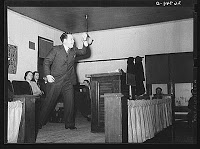Uncategorized
What’s Needed for Labor Success in the South: Some Holiness Fire!

Pentecostal Preacher
TOUGALOO, Miss. – I’m a Catholic now, but I grew up in the Pentecostal Holiness Church. My grandfather was a Holiness preacher. I know about revivals. Preachers exhort, and people respond. They sing, they shout, they come to the altar, and they pray.
Everything seems possible at a revival. People can conquer the world at a revival. They feel they’re not alone. They look around and see the spirit flowing through the congregation. When it’s over, they file out into the night like so many Christian soldiers “marching as to war.”
That revival spirit is what invigorated civil rights activists in the 1960s. Think of all the reverends who led that movement –– Martin Luther King Jr., Ralph Abernathy, Hosea Williams. The march on Selma in 1965 began in a church. Think of all the churches the racists burned hoping to kill the movement.
Any social movement in the South needs religion as part of its DNA if it’s going to succeed. What was true for the civil rights movement in the 1960s is true for the labor movement today. Labor organizing in the South must be a “civil rights crusade,” Congress of Industrial Organizations leader Philip Murray said many years ago.
The spirit of revival certainly was in the air at Tougaloo College’s Holmes Hall January 29, where a crowd of 200 or more gathered to show support for Nissan workers seeking a union election at the giant plant in nearby Canton, Miss. Preachers, workers and activists talked of labor rights as civil rights. A men’s choir fired things up with “Look, Oh Happy Day” and other songs.
“I pastor people who work at Nissan,” Bishop Ronnie Crudup of the New Horizon International Church told the crowd. “I’m outraged that in 2013 –– this is not 1930 ––intimidation and threats could be used on citizens in the state of Mississippi. We say to Nissan, `This is unbecoming (of) you. Allow the union to give their side and allow workers to hear both sides.’”
The rally at Tougaloo College –– a place rich in civil rights history–was the latest community response to a years-long organizing effort by the United Auto Workers. The Nissan plant in Canton is ground zero in its struggle to break through the wall of non-unionized foreign-owned auto plants in the South. Success or failure could be pivotal, not only to the UAW’s future but also the future of the labor movement in this country.
Nissan’s worldwide workforce is largely unionized, but CEO Carlos Ghosn has strongly resisted union efforts here in Mississippi and Tennessee. Workers in Canton say they’re subjected to endless anti-union meetings with management.
“Plant closings and layoffs are things they talk about,” Nissan worker James Brown said. “If Nissan has an anti-union video, we’re asking the UAW to show a pro-union video. It’s not just about money. It’s about retirement, health care.”
It’s also about respect and human dignity, workers said at the rally. They told of arbitrary decisions by management to reduce pension benefits, change work hours, delay or eliminate pay raises, and expand the plant’s temporary workforce. Nissan officials insist direct relations between management and individual employees are best, not “third party” representation by a union.
Ironically, Mississippi’s anti-union governor, Phil Bryant, has actually encouraged outside (also known as “third”) parties to help prevent unions from coming to Mississippi auto plants.
When the Freedom Riders arrived in Mississippi a half-century ago, their task to integrate what historian James Silver called the “closed society” must have seemed impossible to most. Nowhere was the resistance to racial integration stiffer. To succeed they had to appeal to the nation’s conscience, its sense of right and wrong. Theirs had to be a broad social movement that involved more than integrating a water fountain or a movie theater.
To succeed the labor movement must be about more than paychecks. “Human rights are worker rights, and worker rights are human rights,” Mississippi’s fighting labor priest, Father Jeremy Tobin, told the crowd January 29.
Workers have a legal and a human right to organize, to speak as one voice across the table from management on issues that affect their lives. They should not be intimidated and threatened for exercising that right.
Back in the 1930s, the lowest paid workers in the Southern economy –– sharecroppers and tenant farmers –– organized together as the biracial Southern Tenant Farmers’ Union, and they won key battles in getting plantation owners in the Mississippi and Arkansas Delta to recognize their rights. They did this despite gun-toting vigilantes who tried to stop them.
An STFU rally was like “a southern evangelical revival,” Mississippi-bred historian Elizabeth Anne Payne has written. “Fiery sermons, passionate exhortations, and emotional hymns … gave testimony about the power of the STFU in Holiness style, witnessing that the Holy Spirit could instantly transform lives through the union.”
I saw some of that spirit at Tougaloo College January 29.
Joe Atkins is a veteran journalist and columnist who teaches journalism at the University of Mississippi. He can be reached at jbatkins@olemiss.edu.


























